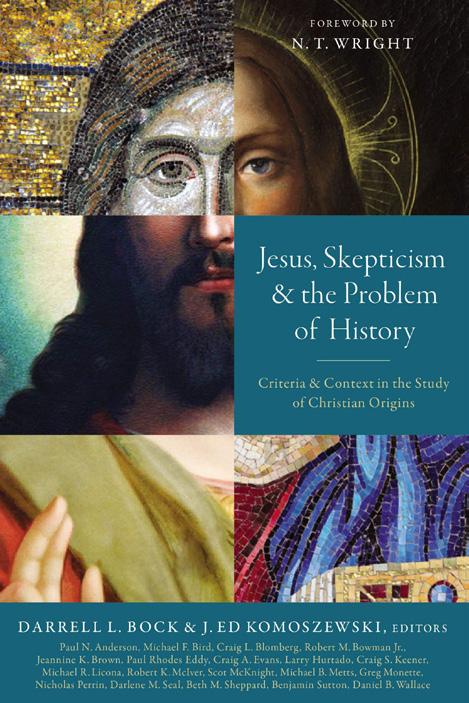
3 minute read
Jesus, Skepticism, and the Problem
Book Reviews
Benjamin C. Shaw Student Fellow, Center for Apologetics & Cultural Engagement
Jesus, Skepticism, and the Problem of History is the product of several Evangelical scholars and offers a valuable addition to the historical study of Jesus. The book addresses recent and developing issues in historical methodology for the study of Jesus and early Christianity. Examples of how various methods and criteria should be worked out in practice are provided by a number of examples from the Gospels and Acts. Although there is a brief forward by N.T. Wright, there is no introduction to the book. Rather, the reader is presented with seventeen chapters separated into four parts.
Part one addresses the importance of the historical research and its relationship to the church and examines a number of historiographical issues surrounding the life of Jesus. There is also significant discussion on recent Evangelical contributions to academia. Craig Blomberg and Darlene Seal note that the “proliferation of evangelicals in the academy means that there is hardly a discipline… of New Testament, Gospels, or Jesus research in which committed, Bible-believing Christians have not published significant works at the highest levels of scholarship” (53).
Part two continues this theme by providing some examples of Evangelical scholarship concerning historical methodology, the Gospels, and the historical Jesus. There are a number of chapters that identify how and why various historical criteria can add probability to an event’s occurrence and provide various test cases (Jesus’ trial [205-221], the burial [269-284], and the resurrection [285-302]). One especially significant chapter emphasizes the growing interest in Johannine studies for historical Jesus research (222-268). Towards the end of part two, there are several useful chapters which advance the present discussion regarding recent trends in historical Jesus studies that engage historical criteria (93-124), the reliability of memory in oral cultures (125-163), and considerations to new perspectives in historical research itself (164-204).
Part three moves in a similar direction, but with an emphasis on Acts. Here, social memory is considered in light of distinctions between events and interpretations (305-319). Even more substantial is Craig Keener’s chapter on the historicity of Acts (320-338).
The final segment of the book includes a very helpful section in which three authors – Larry Hurtado, Scot McKnight, and Nicholas Perrin – offer their own responses and reflections to the contributors of the preceding chapters. This book serves as a great introduction to the several methodological and historical questions regarding the historical study of the New Testament. It also helps advance the academic discussion on these issues by identifying several important nuances, caveats, and critiques while also offering deeper analysis of Evangelical developments in these fields.
Bock, Darrell L., and J. Ed Komoszewski, eds. Jesus, Skepticism, and the Problem of History: Criteria and Context in the Study of Christian Origins. Grand Rapids, MI: Zondervan Academic, 2019. $34.99. 389 pp.
Come alongside the Church to fulfill the Great Commission! Come alongside the Church to fulfill the Great Commission! Come alongside the Church to fulfill the Great Commission!
LISTEN TO LEADERS LISTEN TO LEADERS LISTEN TO LEADERS
LEAD OTHERS TO CHRIST LEAD OTHERS TO CHRIST LEAD OTHERS TO CHRIST 0:00 -19:71 0:00 -19:71 0:00 -19:71
School of Divinity Podcast School of Divinity Podcast School of Divinity Podcast
LAUNCHING JANUARY 2020 Listen on iTunes, YouTube, and SoundCloud! LAUNCHING JANUARY 2020 Listen on iTunes, YouTube, and SoundCloud! LAUNCHING JANUARY 2020 Listen on iTunes, YouTube, and SoundCloud!
LEARN ABOUT SCRIPTURE LEARN ABOUT SCRIPTURE LEARN ABOUT SCRIPTURE
Shawn Akers Mark Allen Joseph Brewer Gabriel B. Etzel Keith Faulkner Mark Foreman Benjamin K. Forrest Chris Gnanakan Edward Hindson Gary Isaacs Linda Mintle Karen Swallow Prior Gary Sibcy Samuel C. Smith
1 Corinthians 15:58

